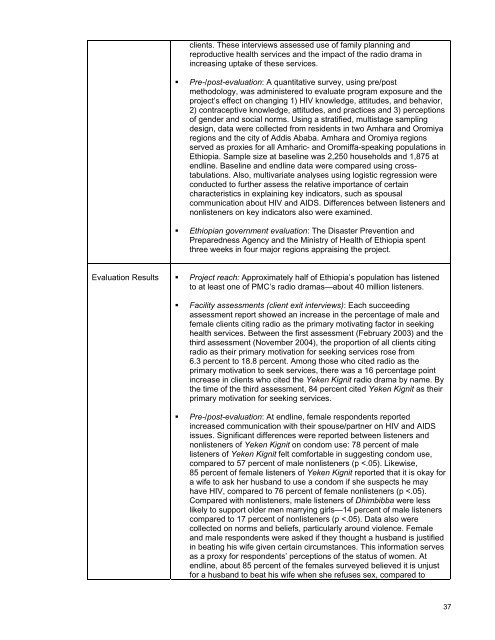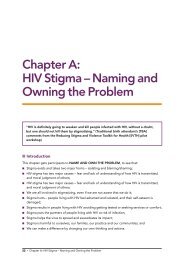Implementing Multiple Gender Strategies to Improve HIV and ... - ICRW
Implementing Multiple Gender Strategies to Improve HIV and ... - ICRW
Implementing Multiple Gender Strategies to Improve HIV and ... - ICRW
Create successful ePaper yourself
Turn your PDF publications into a flip-book with our unique Google optimized e-Paper software.
clients. These interviews assessed use of family planning <strong>and</strong><br />
reproductive health services <strong>and</strong> the impact of the radio drama in<br />
increasing uptake of these services.<br />
• Pre-/post-evaluation: A quantitative survey, using pre/post<br />
methodology, was administered <strong>to</strong> evaluate program exposure <strong>and</strong> the<br />
project’s effect on changing 1) <strong>HIV</strong> knowledge, attitudes, <strong>and</strong> behavior,<br />
2) contraceptive knowledge, attitudes, <strong>and</strong> practices <strong>and</strong> 3) perceptions<br />
of gender <strong>and</strong> social norms. Using a stratified, multistage sampling<br />
design, data were collected from residents in two Amhara <strong>and</strong> Oromiya<br />
regions <strong>and</strong> the city of Addis Ababa. Amhara <strong>and</strong> Oromiya regions<br />
served as proxies for all Amharic- <strong>and</strong> Oromiffa-speaking populations in<br />
Ethiopia. Sample size at baseline was 2,250 households <strong>and</strong> 1,875 at<br />
endline. Baseline <strong>and</strong> endline data were compared using crosstabulations.<br />
Also, multivariate analyses using logistic regression were<br />
conducted <strong>to</strong> further assess the relative importance of certain<br />
characteristics in explaining key indica<strong>to</strong>rs, such as spousal<br />
communication about <strong>HIV</strong> <strong>and</strong> AIDS. Differences between listeners <strong>and</strong><br />
nonlisteners on key indica<strong>to</strong>rs also were examined.<br />
• Ethiopian government evaluation: The Disaster Prevention <strong>and</strong><br />
Preparedness Agency <strong>and</strong> the Ministry of Health of Ethiopia spent<br />
three weeks in four major regions appraising the project.<br />
Evaluation Results • Project reach: Approximately half of Ethiopia’s population has listened<br />
<strong>to</strong> at least one of PMC’s radio dramas—about 40 million listeners.<br />
• Facility assessments (client exit interviews): Each succeeding<br />
assessment report showed an increase in the percentage of male <strong>and</strong><br />
female clients citing radio as the primary motivating fac<strong>to</strong>r in seeking<br />
health services. Between the first assessment (February 2003) <strong>and</strong> the<br />
third assessment (November 2004), the proportion of all clients citing<br />
radio as their primary motivation for seeking services rose from<br />
6.3 percent <strong>to</strong> 18.8 percent. Among those who cited radio as the<br />
primary motivation <strong>to</strong> seek services, there was a 16 percentage point<br />
increase in clients who cited the Yeken Kignit radio drama by name. By<br />
the time of the third assessment, 84 percent cited Yeken Kignit as their<br />
primary motivation for seeking services.<br />
• Pre-/post-evaluation: At endline, female respondents reported<br />
increased communication with their spouse/partner on <strong>HIV</strong> <strong>and</strong> AIDS<br />
issues. Significant differences were reported between listeners <strong>and</strong><br />
nonlisteners of Yeken Kignit on condom use: 78 percent of male<br />
listeners of Yeken Kignit felt comfortable in suggesting condom use,<br />
compared <strong>to</strong> 57 percent of male nonlisteners (p
















